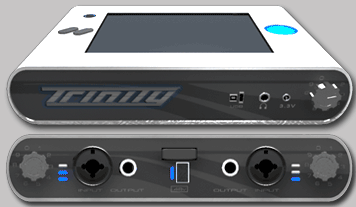Roland Stewart of Trinity Audio Devices writes in to clear up a number of the questions we had about their upcoming portable Linux-based audio recorder. While the device is a bit pricey, with a list expected at US$999, it will certainly do things other devices can’t: it’s a full-blown computer, but without the power consumption problems usually associated with that, and it’s price-competitive with some of the higher-end hard disk recorders, but with the ability to run any Linux software you want. That last point is where some of the more interesting details emerge. I’m not sure it’ll make me give up my laptop, since I care about having a full-sized screen and keyboard and having the horsepower to run soft synths, but if you’re looking to invest in a field recorder and want computer-style editing, this will be one worth watching as it evolves, especially as a Linux-based rival to new ultra-portable Windows PCs. (And yes, I do agree, laptops are overly bulky to work as field recorders.)

Roland writes:
On the design concept and specs: My roots as an audio engineer and remixer are based on Mac and Pro Tools since 1990. The desire and vision to ‘roll out’ a Pro appliance in Linux was only motivated by constant claims that Linux doesn’t stack up to Windows and Mac. I really just wanted to create something to contribute to the advancement of Linux audio as a Pro solution. I’m over Pro Tools and big bulky solutions. The project itself is in the 16th month of development. We quickly prototyped an X86 version, but right away there were way too many power and power management issues. I noticed that UMPC is experiencing those issues now. [Ed.: Other readers could probably comment more on the UMPC, but my sense was that this wasn’t the last word in Intel’s lower-power platform, that the hardware may remain a work in progress. Then again, Intel has stiff competition in the small devices space, so it’ll be interesting to see how this shakes out. -PK]
So basically we have spent a year perfecting and polishing our ARM9 [processor] solution. Granted, better website info and photos of the unit would be helpful, but we are limited by delivery times and schedules of our vendors. The next preview of the device will be the ‘retail version’ prototype.
When deciding what would be Trinity’s’ core, I had to decide what minimal features and components do I need to produce or remix a track of professional quality. I am confident that it can be done with what Trinity provides. Now I don’t expect someone to produce the soundtrack for the next Spiderman movie on Trinity but you could certainly sample your source audio for it quite well.
On the input device: Somehow Henry at Linuxdevices wrote that Trinity has a touchscreen; it doesn’t. We tested the touchscreen and touch just has too many drawbacks and we didn’t want to tote the touchscreen baggage. We figured we would have enough issues as a ‘come out of nowhere new product’ to load up on touch issues. Also, in order for the Compulab SoM to interface with our base board Codec you have to remove the AC97 codec on the SoM. When you do that you lose touch capabilities entirely.
We literally dabbled with a few solutions including the ‘Q’ click wheel and others. The biggest drawback here is we felt the
safest ease of use was to make sure the HID acted like an extension of your hand. Synaptics provided us with their roundpad touchpad which acts exactly like the touchpad on a laptop. Ed: This decision makes sense to me. Synaptics makes fantastic touchpads for many of the PC laptop makers — and Apple, incidentally — so this may be more reliable than relying on a touchpad.On Software: Peter, I gotta tell you, the new features in Audacity 1.3 make the app pretty good. Colapsing tracks and the ability to shift/slip tracks are a real improvement. Currently we are running Debian [Linux distro], with XWindows (tiny x) and Blackbox desktop. We want to deliver an appliance running audio apps with a desktop. Blackbox is minimal, but I would like to see KDE by the time we ship. About Transmission (our audio app) I really think when we have this running on Trinity, then we will make some heads turn… but that will take some more time to complete.
Computer I/O [In addition to the audio I/O] The unit has 2 available USB ports one slave and one host. You can plug
it into your PC and the PC will see Trinity as a hard drive so you can transfer audio or sessions over. The other USB port allows for any type of USB music instrument. I noticed all of these USB-based turntables and mixers are coming out.
Definitely some interesting details in there. The most important point to me is the ability to run your own software under Debian Linux. I’m actually surprised Roland wants to replace the Blackbox windowing interface with something like KDE, as I’d personally rather have something simpler and more lightweight. But because this is Linux, and because Roland says he will encourage people to customize, there are broad possibilities for what people could do with this device.
Audacity 1.3 also does sound promising; part of the reason the current Audacity is in such poor shape and has lacked updates so long is that the development community have been focused on 1.3 for some time. I think we’ll really see whether this device is useful when we see what custom software Roland has in store for it.
We won’t know for sure until this ships and is a real product, but it’s interesting enough to keep an eye on it, so stay tuned.